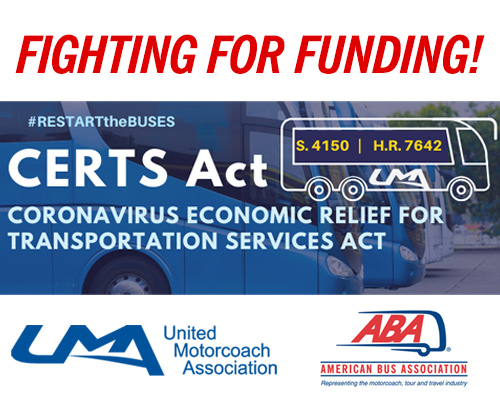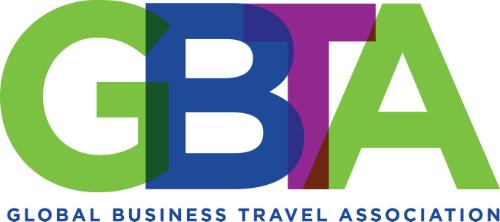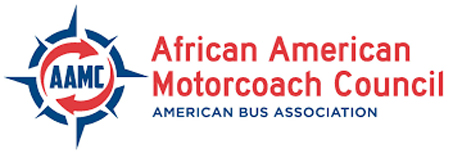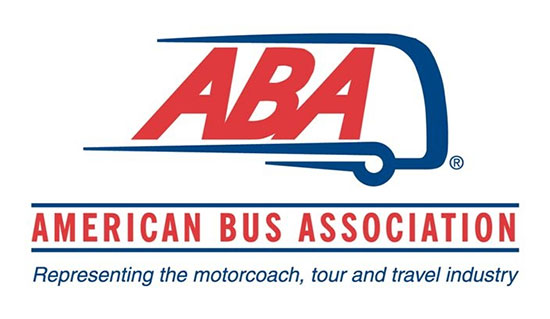- Details
- Category: Industry News
The leading national bus associations—the United Motorcoach Association (UMA) and the American Bus Association (ABA)—continue to fight for federal funding to help operators who have been impacted by COVID and they need your help. The Delta variant introduces new wrinkles in the industry’s recovery, making travelers and state officials nervous. As Congress is working on the Biden administration’s $3.5T American Jobs and Families Plan reconciliation bill, both ABA and UMA hope that industry-supporting lawmakers will include another $6B for the Coronavirus Economic Relief for Transportation Services (CERTS) Act, the $2B program that was included in the Trump administration’s final COVID relief package back in December 2020.

The long-awaited CERTS program finally opened to applications in June 2021, with more than 2,000 companies submitting paperwork for the funding (1,600 of them motorcoach operators) by the July deadline. ABA Senior Vice President of Governmental Affairs Suzanne Rohde said that more than 1,500 of those applications have been approved with an average allocation of $1.3M. Approved companies started receiving funds on August 11, which is expected to be allocated to operators over two payments (80 percent and 20 percent).
However, the Treasury Department recently announced that the companies in the motorcoach industry, school bus, passenger vessel, and pilot vessel industries lost collective revenues of $8.7 billion in 2020—which doesn’t account for 2021 and the roller-coaster openings and shutdowns. The original CERTS push in 2020 called for $10B in funding, which was reduced to $8B and finally passed at $2B.
Thanks to a robust grassroots effort among the associations, operators, and suppliers nationwide, the CERTS Act garnered the support of a full two-thirds of both houses—which is needed again. The American Jobs and Families Plan is slated for a late September vote (after Congress returns from its August recess), so the associations are urging operators and industry supporters to contact members of Congress immediately. Both the UMA and ABA have set up easy portals to connect operators with their members of Congress:
- ABA portal (also available here)
- UMA portal
“Our businesses are essential components of our nation’s infrastructure and critical to our nation’s security,” said UMA President & CEO Larry Killingsworth in Bus & Motorcoach News. “Originally, CERTS was to be funded at $8 billion to save our industry. Upon final passage, the amount was cut down to $2 billion, despite the critical needs of our businesses.”
“Things are being reevaluated with the Delta variants,” said Rohde during a recent ABA webinar. “The future is very uncertain and now is the time to be advocating for additional funding for [this] program.” She added, “The program is already in existence, we just need more funding added to it.”
Rohde also encouraged operators who have been approved for CERTS funding to read the Treasury’s updated FAQs and other paperwork (updated 8.12) to ensure that they are complying with the terms of the grant. The money is to be used for payroll costs (at least 60 percent), as well as acquisition of services, equipment, including PPE and protection measures from COVID for workers and customers; continued operations and maintenance of existing equipment and facilities; rent, leases and insurance; and interest on regular debt service. Visit the Treasury’s CERTS page here.
Visit buses.org and uma.org for more information about the ABA and UMA, respectively.
[08.30.21]
- Details
- Category: Industry News
The business travel industry continues to report an overall willingness and optimism about the return to travel. However, the rise of the Delta and other variants has become a cause for uncertainty and increased concern over the past month. This is according to the latest poll from the Global Business Travel Association (GBTA)—its 22nd since the beginning of the pandemic.

“Business travel continues to make progress and show small gains on the road to recovery. The Delta variant has introduced a bit of a detour, at least for the near term. With the support of adequate risk mitigation, travelers continue getting back to business during a pandemic that is not going away as quickly as hoped,” said GBTA CEO Suzanne Neufang. “The industry continues to be resilient, adaptable, and committed to moving forward for safe and responsible business travel for employees and companies around the world.”
 GBTA Executive Director Suzanne Neufang
GBTA Executive Director Suzanne Neufang
Solid indicators on the road to business travel recovery
- More travel ahead. Over half reported they expect business travel will see a ‘significant’ (8 percent) or ‘moderate’ (47 percent) increase between September and November 2021. Respondents from Europe (75 percent) are more likely than those in North America (51 percent) to expect that business travel will see a significant or moderate increase during this time.
- Spending ticks up, bookings steady. When travel buyers and procurement professionals were asked how company travel spend had changed compared to the prior month, over half (56 percent) reported their company’s spending increased ‘somewhat to a lot.’ When travel suppliers and travel management companies were asked about their bookings in the previous week, almost half (46 percent) report their bookings had ‘remained the same.’
- Small gains. Poll respondents reported a slight increase in re-opening international and domestic travel versus the month prior. In the current poll, 78 percent had not opened international travel, compared to 86 percent in July. Forty-one percent have not re-opened domestic travel, versus 50 percent last month. Fewer respondents (51 percent) reported they continue to suspend or cancel all business travel regardless of location (down from 60 percent in the July poll).
- Staying the course. Despite growing concerns about the Delta variant, only 21 percent said their company has introduced new restrictions on non-essential business travel at this point. Almost half (49 percent) said their company is unlikely to introduce new restrictions, while one in four (25 percent) are considering introducing new restrictions. Respondents from Europe (66 percent) are more likely than those in North America (45 percent) to report their company is unlikely to introduce new restrictions on non-essential business travel specifically as a result of the Delta variant (or other variants).
Delta derails recovery a bit
- Optimism slows. One-third (34 percent) of supplier and travel management company respondents said they are ‘optimistic’ about the financial prospects of companies in the business travel sector, but less so compared to a month ago. An additional one in four (38 percent) said they feel ‘neither optimistic nor pessimistic,’ and one in four (26 percent) said they feel ‘pessimistic’ about the industry’s financial prospects.
- On hold last month, on hold this month. Eight in ten travel buyers/procurement professionals who work for companies that have not yet resumed non-essential business travel reported their company is likely to delay the resumption of non-essential domestic (81 percent) and international (79 percent) business travel due to the Delta variant (and other variants). Business travel for large, medium, and small meetings, events, or conferences were also most frequently cited as being canceled or suspended.
Travel vaccination policies and employee safety protocols
- Vaxxed to travel? Almost half of respondents said vaccine requirements to perform key business functions are not typically required. Approximately one in five reported their company requires employees to receive a COVID vaccine in order to travel domestically for business (21 percent); meet customers face to face (22 percent); work in the office (20 percent); and attend large meetings, conferences, or events (22 percent).
Respondents from Europe (66 percent) were more likely than those in North America (52 percent) to report their company will not require employees to receive a COVID vaccine before they can meet face to face with clients and customers.
View more highlights or the entire results of this and previous polls here.
Visit gbta.org for more information.
[08.30.21]
- Details
- Category: Industry News

The American Bus Association announced the creation of the African American Motorcoach Council (AAMC), which joins the other networking and business councils that are a part of longtime motorcoach association.
 Clarence Cox and Wendy Cox of Georgia Coach Lines
Clarence Cox and Wendy Cox of Georgia Coach Lines
“ABA created the African American Motorcoach Council after identifying a need among our Black-owned motorcoach operator members to have a concentrated, unified voice and lobby on behalf of their businesses,” said ABA President &CEO Peter Pantuso. “While the entire motorcoach industry has been devastated by the COVID pandemic, some sectors and businesses have been hit harder than others. We wanted to give these companies another opportunity to come together within the ABA member community like we have with the Women in Buses and Hispanic Motorcoach Councils and present a united front to help secure additional funding for other motorcoach operators and for the industry.”
The main priority of the AAMC, which is being led by Clarence Cox of Georgia Coach Lines in Fayetteville, Ga., will be to help ABA in lobbying for more federal government funding for the motorcoach industry, especially on behalf of small, family-owned, minority businesses.

Members of the AAMC are already up and running contacting members of the Congressional Black Caucus in support of the industry’s grassroots initiatives and educating them about the motorcoach industry. The first official meeting of the AAMC will be held virtually at a future date and in person at ABA’s 2022 Marketplace in Grapevine, Texas, next January 8-11.
Anyone interested in participating in the AAMC should reach out to ABA’s Membership Team at membership@buses.org or call 202.218.7234.
Visit www.buses.org for more information.
[08.27.21]

